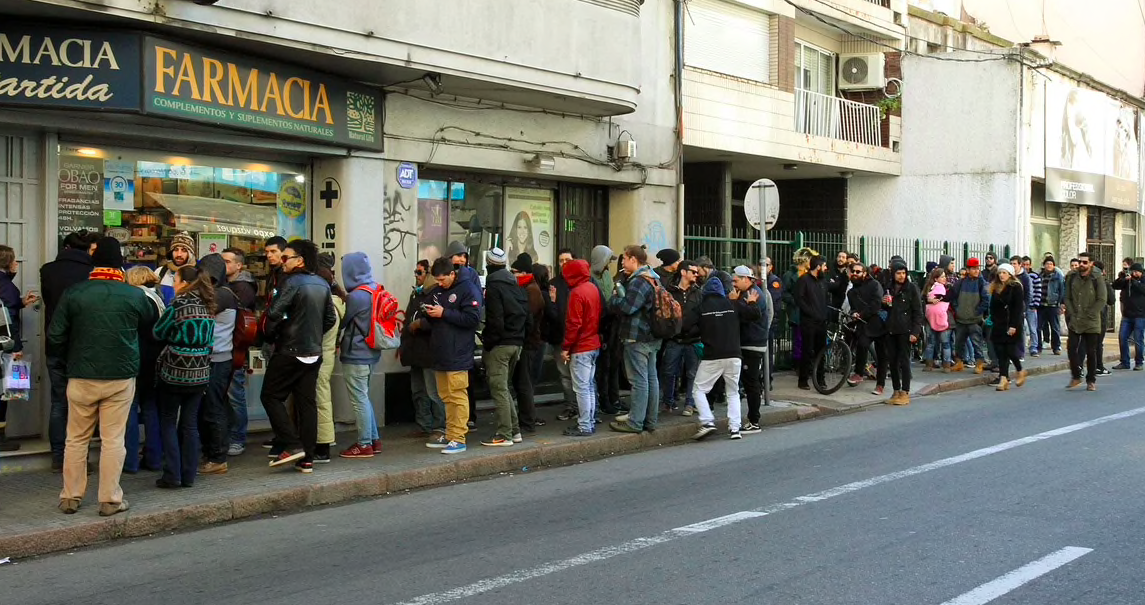RIO DE JANEIRO, BRAZIL – Neither fearsome “zombie gangs” nor exponential addiction are glimpsed in a Uruguay that, five years after opening the sale of marijuana in pharmacies, sees in the rear-view mirror a pioneering process that overcame “stumbles” and kept gaining support.
An image marked July 19, 2017: with long lines waiting outside, Uruguayan pharmacies began to offer packages of legal marijuana that closed the circle of the process approved by law in 2013.
Read also: Check out our coverage on Uruguay
ZOMBIES THAT NEVER CAME
Five years later, in the Antártida pharmacy, one of the 16 that opened the sale, calm reigns and only the particular procedure of presenting the fingerprint distinguishes the sale of cannabis from that of medicines.

It is that, as its owner, Sergio Redín, assures Efe, despite initial fears, the sale went “without any problem” and not even the most “conservative” customers stopped buying there.
“When we applied we had our fears; it was something totally new, many pharmacies were against it. Fears of security, that there would be social rejection, of the clientele. None of that happened,” he stresses.
The former Secretary General of the National Drug Board Milton Romani – who accompanied the state process until 2016 – expresses himself in the same vein and remarks that on that day it was clear that there were many unfounded “myths” around the issue.
“On July 19, 2017, an icon fell, a generalized prejudice. Pharmacies opened, they began to sell to those who were registered; there were no zombie gangs attacking pharmacies as some predicted,” he emphasizes.
This is just one of several myths that, says Romani, hovered over the process of regulating the sale of cannabis provided for in the law promoted by the Government of José Mujica (2010-2015) to fight drug trafficking.
He adds that it also transpired that Uruguay “was going to be flooded” with Brazilians or Argentines who would come to buy marijuana and that consumption in the country would increase exponentially, something that did not happen.
“The scientific research that has been carried out has shown that the legalization and regulation of cannabis has not increased consumption. Chile has neither regulated nor legalized consumption and has more consumption than Uruguay. In Uruguay, at first it grew a little and now it has stabilized,” he explains.
STUMBLES THAT ARE NOT FALLS
Juan Ignacio Tastás, executive director of the Institute for the Regulation and Control of Cannabis (IRCCA) of Uruguay, assures that the process, which was “pioneer” on a global scale and had cannabis clubs and self-cultivation as its other pillars, was not free of “stumbles”.
In the case of pharmacies, which today have 49,630 buyers registered to receive up to 10 grams per week, Tastás says that the main problem was shortages, which generated “discouragement” in consumers.
In this Redín agrees, who notes that the fact that demand exceeds supply is “logical” when a process as controlled as that of this law is inaugurated, but anticipates that the situation today “was totally reversed”, since there is “ample supply”.
Meanwhile, a stumbling block with no solution on the horizon for Tastás is the financial difficulty, since US banks and, accordingly, Uruguayan ones, recognize the sale of cannabis as illegal and this makes it difficult to operate in pharmacies.
Another important self-criticism brings Mujica, who regrets that he did not take more advantage of the medicinal route for having advanced with “much parsimony”.
“We could have exploited that law and have become a vanguard of the medicinal use of marijuana, because companies from outside came like weeds, but we played a retention game (…) in the bureaucratic gears and now they began to produce marijuana for medicinal purposes in various places with or without law,” he told Efe.
A NEW CHAPTER
While in the center of Montevideo several people enter the Antártida pharmacy to ask for the “Alfa” or “Beta” varieties, Redín believes that the new impulse for consumers will come with the new variant that the IRCCA is already preparing and that will increase the psychoactive THC from the current 6% to 12 or 13%.
Testás assures, however, that the IRCCA does not seek to generate products with more psychoactivity but to retain consumers who would seek this in unsafe ways.
“What we’re trying to do is to move existing consumers from illegal or other sources of supply,” he explains.
On the other hand, to which only 28 pharmacies have adhered so far, Testás highlights that they are seeking to convince more pharmacies to at least “double” that figure throughout the country.
It is that, as reflected in a recent survey by the Cifra pollster, the approval of the regulated sale went from 24% in 2012 to 48% today, for which almost half of Uruguayans support the pioneering law.

